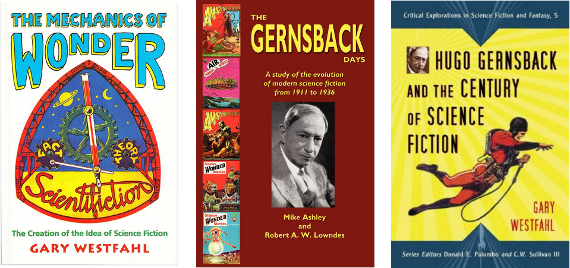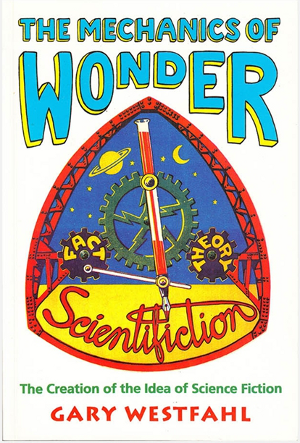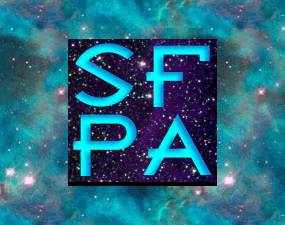 I have just completed reading three books that I ought to have read long before. They’re all histories of the creation of the science fiction genre, two by Gary Westfahl and one by Mike Ashley with Robert A. W. Lowndes and, to say that these three volumes turn the history of our genre on its head is a gross understatement.
I have just completed reading three books that I ought to have read long before. They’re all histories of the creation of the science fiction genre, two by Gary Westfahl and one by Mike Ashley with Robert A. W. Lowndes and, to say that these three volumes turn the history of our genre on its head is a gross understatement.
Largely because they do no such thing. What they actually do is restore an understanding of the real history of the evolution of our genre.
The three books in question are Gary Westfahl’s The Mechanics of Wonder: The Creation of the Idea of Science Fiction and Hugo Gernsback and the Century of Science Fiction and Mike Ashley and Robert A. W. Lowndes The Gernsback Years: A study of the evolution of modern science fiction from 1911 to 1926.
It has long been held that there are two constants when it comes to the evolution of science fiction: first, that science fiction has always been present in world literature, even if it was not called science fiction when the Greeks and the unnamed authors of the Icelandic Sagas were writing it; second, that the greatest influence on the genre was and still remains the long, tall, smoke-wreathed shadow of one John Wood Campbell, Jr. A side note to these historical truths is that we all would have been better off if someone other than Hugo Gernsback had launched the first science fiction magazine (and helped launch fandom, and eventually arrived at the name for our genre and…).
That third truth, little remembered in our modern times, is that Hugo Gernsback did far more harm than good when he established the world’s first science fiction magazine. This contention is usually accompanied with references to trashy pulp writing with an emphasis on stereotypical characters, gosh-wow purple prose, an anti-literary approach and failed to respect its authors.
These myths – and myths they are – have been perpetuated by well-intentioned individuals over the years, authors and critics who have attempted to help us define the genre, explain what it is and what it is not in works such as Brian Aldiss’ Trillion Year Spree (formerly Billion Year Spree); Darko Suvin’s Metamorphoses of Science Fiction: On the Poetics and History of a Literary Genre, Samuel Moskowitz’s various and sundry “histories” of fandom and the genre (the history of fandom and the evolution of the science fiction genre are inextricably linked) and works of critical commentary by authors such as J. O. Bailey, Kinglsey Amis and Thomas D. Clareson.
In his introduction to Mechanics Westfahl details a flaw in methodology that has plagued the critical analysis (and thus the commonly accepted history) of the science fiction genre thusly:
In fact, I would go much further and argue that, in the case of a literary genre which emerges as a widely acknowledged historical fact, major works of contemporary criticism constitute far more than an interesting accompaniment to or alternate source of information about the genre: they are in fact parts of the genre themselves. From this perspective, A Defense of Poesie is an essential component of Renaissance literature…criticism functions as the necessary binding force that creates, sustains, and preserves the integrity and identity of the genre. Thus a study of science fiction that does not take into account its own accompanying critical tradition is not only weakened by that omission, but it is fatally flawed. (Emphasis added.)
If critics are free to ignore contemporary criticism in a genre and look only at texts, then the door is open for them to define the genre in any way they choose, select as exemplars any works they choose, and reach any conclusions that they choose. (Emphasis added)
The dangers can be illustrated by a hypothetical example: imagine a critic of Romantic poetry who decides that the genre’s true spirit is found in the satirical works of later Romantics like Shelley’s ‘England in 1819’ and Lord Byron’s Don Juan; so she defines Romantic poetry as a special form of satirical verse…
Such a study, one hopes, would be laughed at and ignored.
Yet my example is analogous to the critical approach taken in the two most important and influential critical studies of science fiction [Billion Year Spree, Metamorphoses].
 The lack of taking contemporary critical analysis into consideration has led to Aldiss’ widely accepted theory that science fiction has evolved from the Gothic novel; this theory (extending the roots of SF back to Shelley’s Frankenstein) has also led to the unfortunate aggrandizement of such works as Lucian’s True History, de Bergerac’s various trips into space and the like as “prototypical” science fiction.
The lack of taking contemporary critical analysis into consideration has led to Aldiss’ widely accepted theory that science fiction has evolved from the Gothic novel; this theory (extending the roots of SF back to Shelley’s Frankenstein) has also led to the unfortunate aggrandizement of such works as Lucian’s True History, de Bergerac’s various trips into space and the like as “prototypical” science fiction.
Westfahl argues that while these works may have contained elements that we recognize today as science fictional, they can not be “science fiction” as they were created prior to the genre’s advent, and since “science fiction” means something specific (it is not the mere combination of two words), than works created prior to its creation can not be “science fiction” (or even prototypical); only those works written when science fiction was defined will qualify. We can certainly find elements of science fiction in precursor works. But the mere possession of shared recognizable features is not enough. This would be akin to stating that a Conestoga Wagon is an automobile because both have axles and wheels. Both are vehicles (literature), but one is not an auto (science fiction). Despite the presence of shared elements, the two are demonstrably different through an examination of their other (non-shared) characteristics
The evolution of a genre is very similar to the evolution of species; small incremental steps take place and at some point, a new species is identified. That new species is defined by elements that, in combination, are unique. Both fish and sharks have fins and gills, but one would not identify either based on these characteristics alone, otherwise, one might call both “fish” or “shark”. Prototypical science fiction may have fins, or gills, but does not possess all of the characteristics required to call them “science fiction”.
Furthermore, all of them were written prior to Gernsback’s formulation of the essential elements of a separate genre. Which are: entertainment, engagement with science/technology/scientific principals and the incorporation of extrapolative elements.
Westfahl spends quite a bit of time taking up and knocking down the various genre theories that have been put forth over the years (very effectively, I might add) , pointing out their flaws (far too much detail there for inclusion in a review) and then offers up his contention that Hugo Gernsback is solely responsible for defining, refining and implementing an entirely new literary genre called “science fiction”.
But, it will be argued, Gernsback filled the early issues of Amazing Stories with works that predate the creation of the genre…and this is true (Wells, Verne, Poe, etc), but only out of necessity. Gernsback carefully selected non-SF works that contained some of the elements he was looking for, while at the same time trying to encourage authors to write exactly what he had defined as scientifiction. As more authors began to adopt the criteria for an SF story, reprints in Amazing Stories diminished in volume.
He summarizes this section of his discourse with the following:
…first, there are absolutely no grounds for arguing that anything resembling a ‘history of science fiction’ actually existed as a historical fact in contemporary perceptions before the nineteenth century; and second, any wide understanding of science fiction as a genre was at best limited and flawed until Gernsback’s breakthrough in the 1920s. So, if we define a genre as consisting of a body of texts related by a shared understanding of that genre as recorded in contemporary commentary, than a true history of science fiction as a genre must begin in 1926, at the time when Gernsback defined science fiction, offered a critical theory concerning its nature, purposes and origins, and persuaded many others to accept and extend his ideas.
Westfahl then anticipates the protests to this argument and offers the following:
Any genre, to delineate and develop itself, looks to works outside that genre for inspiration and models…[and]…if science fiction can be admitted to the groves of academe only on the basis of its high literary quality, then the case for science fiction must be based on the demonstrated excellence of the works that emerged from the tradition and label of ‘science fiction’, not on the number of distinguished works of the past and present outside that tradition…calling William Shakespeare a science fiction writer does not and cannot make science fiction a respectable genre.
In support of these contentions, Westfahl quotes from various sources, including Alexei & Cory Panshin, David Hartwell and Barry Malzberg:
There can be no question, however, that Amazing Stories was a major turning point in the development of science fiction…Strange and wonderful indeed that an explicit formulation of SF as limited and externalistic as this one by Gernsback could manage to serve as an effective summarizing principle for all the different kinds of Technological Age SF story. – C&P Panshin, The World Beyond the Hill
The history of of the world of science fiction dates from the birth of conscious separateness, April, 1926 – Hartwell, Age of Wonders
I think that he did us a great service and that were it not for Gernsback, science fiction as we understand it would not exist…’Science fiction builds on science fiction’, Asimov said once, and that truth is at the center of the form. Before Gernsback gave it a name…the literature did not exist; before he gave it a medium of exclusivity, its dim antecedents were scattered through a range of popular and restricted writing without order, overlap or sequence. It was the creation of a label and a medium which gave the genre its exclusivity and a place in which it could begin that dialogue,…Malzberg – Engines of the Night
In concluding his introductory chapter, Westfahl lays out the anticipated counterarguments to his theory and the standards that each must meet in order to properly refute it. Successful counter arguments would: demonstrate that his definition results in a body of work that is not homogeneous or interrelated; demonstrate that previous efforts are not subjective, illogical or lacking in evidence; or that other fields of genre study have successfully functioned while ignoring the criticism that accompanies it.
To my knowledge, none of the existing alternative theories (Aldiss, Stableford, Suvin, Panshins, etc) are capable of making such claims.
The second chapter of The Mechanics of Wonder is where Westfahl really gets into developing his theory. Titled ‘An Idea of Tremendous Import’: Hugo Gernsback’s Theory of Science Fiction the chapter first explains Wesfahl’s consideration of Gernsback as critic and then details the requirements for developing and defining a genre:
A critic who seeks to define and describe a literary genre must perform these tasks: she must suggest criteria by which a work can be identified as belonging to the genre without reference to any external context; she must articulate who its characteristic readers and authors are and what unique value or purpose works in the genre have for them; and she must delineate the literary ancestry of of the genre and offer exemplary models for authors, readers, and critics.
Along the way he dismisses the argument that Gernsback’s development of the genre was circumstantial to a desire to make money, (In a later chapter he illustrates that Gernsback’s involvement with science fiction was both deep, personal and lengthy, a project he returned to numerous times during his life out of personal interest. I mean, give the guy some credit. After all, he did write Ralph 124C41+ to serve as an exemplar of what he was trying to get at. And – so sue me if it’s a pretty clunky story, but Gary Westfahl once again comes to the rescue. Which you will have to read for yourselves as it is an interesting argument that informs Westfahl’s development of a definition for Science Fiction, an argument even more fully detailed in Hugo Gernsback and the Century of Science Fiction.)
He then goes on to re-state and minutely examine the three elements of Gernsback’s initial definition of science fiction (which appears in the opening editorial of Amazing Stories first issue):
a charming romance intermingled with scientific fact and prophetic vision (emphasis added)
 Small details about the evolution of his magazines and various programs and projects are used to illustrate that this initial definition was anything but a casual, introductory statement: Gernsback hired numerous working scientists to serve on a scientific board; offered contests in which there was a requirement for correct scientific fact, all of it tied in to his stated desire to provide fiction that would inspire a greater degree of engagement with science and technology (an effort begun much earlier with prior magazines including Radio News and The Electrical Experimenter, early attempts by Gernsback to satisfy a desire to use fiction as a means to inspire invention. He even went so far as to suggest to his authors that they seek patents for the concepts they introduce in their stories).
Small details about the evolution of his magazines and various programs and projects are used to illustrate that this initial definition was anything but a casual, introductory statement: Gernsback hired numerous working scientists to serve on a scientific board; offered contests in which there was a requirement for correct scientific fact, all of it tied in to his stated desire to provide fiction that would inspire a greater degree of engagement with science and technology (an effort begun much earlier with prior magazines including Radio News and The Electrical Experimenter, early attempts by Gernsback to satisfy a desire to use fiction as a means to inspire invention. He even went so far as to suggest to his authors that they seek patents for the concepts they introduce in their stories).
It is also here in this chapter that Westfahl begins to lay the foundation in support of the contention that Gernsback’s original definition contains all of the elements necessary to continue to serve (modified and greatly expanded) as a contemporary definition for the field.
He breaks down the kinds of writing needed to satisfy each individual element of that definition and illustrates how Gernsback continued to expand and refine his original definition, along the way answering various charges from other critics and along the way informs us that earlier dismissals of the impact and utility of Gernsback’s definition of SF only really arise because critics are asking the wrong question about science fiction. What they are asking is “What makes science fiction good literature?”, while the question they ought to be asking is “What makes science fiction a literary genre?” or “What makes science fiction science fiction?”. The wrong question is wrong for this reason: the question of literary value can be asked of any type of literature, therefore any definition would resemble a definition of literature. That wrong question also restricts examination of the genre to those works that qualify as good literature. Surely there is science fiction of a less than literary quality? (And who is to say what that quality is?)
I found The Mechanics of Wonder to be extremely fascinating. So much so that we’re only at the middle of the second chapter of this book. I could easily go on with a blow-by-blow, but there are still two other books to discuss, so I’ll note a few other highlights from Mechanics and then have a few words to say about the other two titles, before concluding.
The chapter – ‘A Convenient Analog System’ John W. Campbell Jr’s Theory of Science Fiction provides the long-awaited compare and contrast – Gernsback v Campbell – and demonstrates that Campbell’s efforts are re-castings of Gernsback’s, despite protests to the contrary. Interestingly,Westfahl notes that Campbell hardly ever, if at all, discussed contemporary editors, not even F. Orlon Tremaine who hired him, and suggests that one reason Campbell may have given Gernsback short-shrift was over perceived criticisms received in Gernsback’s intro to the short story Space Rays.
Regardless, we read Campbell’s definition –
Basically, science fiction is an effort to predict the future on the basis of known facts, culled largely from present-day laboratories. Within that broad field – and it is exceedingly broad, indeed, far more so, in fact, that even modern science fiction readers fully realize – there are many species, types, and families of story material – JWC Intro to Who Goes There?
and this is related to Gernsback’s three elements:
…’story material’ (fiction) based on ‘known facts’ (science) which aims to ‘predict the future’ (prophecy).
He then goes on to enumerate the various modifications Campbell introduced to Gernsback’s theory, such as
“Campbell also redefined ‘science’, offering writers a wider range of subjects than Gernsback, who focused on ‘Hard’ sciences. Campbell included social sciences in the range of science fiction – ‘Sociology, psychology, and parapsychology are, today, not true sciences; therefore, instead of forecasting future results of applications of sociological science of today, we must forecast the development of a science of sociology.’
and
Campbell also announced an increased degree of attention to the literary quality of science fiction. In 1968, he placed an emphasis on effective story-telling: Science-fictioneers want stories – entertainment…Poor characterization, poor style, even poor plotting will be willingly forgiven, if the author produces a real yarn. If he’s a wing-ding of a story-teller…What can’t be forgiven is a poor story.’
Campbell’s primary contribution to Gernsback’s genre definition is, in my opinion, made in the area of “prophecy”:
Science fiction writers could not simply predict inventions, but must consider what the results look like when applied not only to machines but to human societies as well
which, as Westfahl demonstrates, leads eventually to Campbell’s introduction of the idea of science fiction as “thought experiment”, a further, more scientifically grounded refinement of Gernsback’s call for “prophecy”.
There is also an interesting aside that accompanies these Campbellian refinements, that of elaborating a different view of the reader of science fiction:
He rejected Gernsback’s concept of a mass readership and, like his predecessor Tremaine, insisted that it could only reach an educated audience: No average mind can either understand or enjoy science fiction. JWC ‘Science-Fiction’, 1938 [repeated 21 years later as] Science-fiction is not, and never will be, a mass-appeal type of material. JWC ‘Non-Escape Material’ and, in a letter to Anthony Boucher, even went so far as to suggest that the ‘ability’ to appreciate science fiction and its unique perspective on reality (discussed below)’is, I am fairly sure (probability about .95, in my estimation) apt to be based on a genetic difference. [Even Campbell thought ‘Fans are Slans’!]
(Observations of discourse in the field today places the above in an interesting position, as some champion Campbell and the fiction that flowed through Astounding as real science fiction, clamoring for action and adventure in a scientifically rigorous tale, while at the same time decrying the inclusion of the soft sciences, literary tropes and the like, while also attempting to diminish the importance of “con-going fandom” in favor of a more populist definition. Apostasy! Their patron saint can be quoted at many times and places – over the course of at least thirty years – regularly endorsing concepts that are apparently anathema to his champions! But there is one place where these detractors of diversity and inclusion are in agreement with Campbell. When working with (the young!) Isaac Asimov, Campbell asserted that “Astounding is, characteristically, authored by young men, with engineering training.” [Emphasis NOT added.] Perhaps here is where we see the primary reason for invoking Campbell and Campbellian science fiction. One lesson to be learned here is that there IS a reason to study history. In doing so, you stand a far better chance of picking a Patron Saint that actually endorses your politics. )
Westfahl then concludes with an examination of Campbell’s contributions, acknowledging that he articulated many refinements, extensions and improvements to Gernsback’s original outline and then goes on to point out that every single one of them originated not with Campbell, but with someone else, prefacing these details with the following:
Indeed, while one anticipated reaction to my explanation of the theories of Hugo Gernsback was – So what? – the most common reaction to explanations of the theories of Campbell will be – Of course. In fact, the ideas about science fiction first promulgated by Campbell have effectively permeated modern critical commentary of all kinds, although Campbell is rarely if ever acknowledged as their source, (Emphasis mine)
…because he was not their source. Following the above, Westfahl lays out ten primary concepts and unearths their original sources, all pre-dating Campbell’s pronouncements.
Several chapters on he lays his arguments vis-a-vis Campbell to rest with an explanation and diminishment of his role in creating the Golden Age of Science Fiction; various critics are quoted (Gunn, Turner, Malzberg, Wollheim, Scholes) all making the case that the time was right, the new writers had grown up already reading science fiction, Campbell was blessed with a decent budget and luck. (Pohl, as editor of Galaxy and If, explains that part of Galaxy’s success was due to his being able to pay “almost as much as Campbell”.)
If Campbell was not responsible for the improved approaches of writers in the 1940s, and if he attracted them solely for economic reasons, there remains the argument that Campbell was an inspiring source for ideas, an insightful and demanding reader, and a stimulus to better science fiction writing. However, I don’t think Campbell was really a particularly talented editor of this kind.
The howls of protest are almost audible. How can one say that about the man whose magazine, Astounding Science-Fiction, was the leader in publishing superior fiction for over a decade?…
This statement is justified through the remainder of the chapter, which I will leave it all to you to read.
Finally (finally!) Westfahl presents a model for a proper history of science fiction and, based on that model, offers up several potential takes on a definition of science fiction, which he redefines as a description of science fiction that accounts for everything that he has laid out previously, returning to his contention that the entirety of critical discourse on the genre is an important and necessary component of the genre’s study, creation and definition:
Without a doubt, no other form of literature has inspired such widespread devotion, such a fervent belief in its own special nature, such an immense volume of commentaries are discussions about that literature. Thus, there is one verifiable claim for the uniqueness of science fiction: its texts have generated an intense shared belief that the genre is unique, an attitude documented in voluminous written commentaries of science fiction.
His initial attempt at that description is as follows:
Science fiction is a twentieth-century literary genre consisting of texts labelled ‘science fiction’ which are associated with explicit or implicit clams that each of its labelled texts has these three traits:
A. is a prose narrative
B. It includes language which either describes scientific facts, or explains or reflects the processes of scientific thought; and
C. It described or depicts some aspect or development which does not exist at the time of writing
 There is further refinement of this description throughout the concluding chapter. Leaving the reader with the following contentions: Gernsback’s deliberately set out to create the science fiction genre; his description of that genre remains its foundation to this day; Campbell’ greatest contribution was as a critic of the genre; the genre IS a unique form of literature.
There is further refinement of this description throughout the concluding chapter. Leaving the reader with the following contentions: Gernsback’s deliberately set out to create the science fiction genre; his description of that genre remains its foundation to this day; Campbell’ greatest contribution was as a critic of the genre; the genre IS a unique form of literature.
I read the remaining two texts as accompaniment to The Mechanics of Wonder. Westfahl’s own Hugo Gernsback and the Century of Science Fiction provides a more detailed look at Gernsback while he was creating and refining the genre as both editor, publisher and author, while Ashley and Lownde’s The Gernsback Days provides excellent resource and backup in great detail to many of the contentions laid out by Westfahl. (Gernsback Days is an excellent resource for anyone interested in the early history of science fiction in the pulps, including a complete inventory of fiction from all of Gernsback’s publications – Radio News, The Electrical Experimenter, Science and Invention, Amazing and its quarterly and annual iterations, Wonder Stories and its companions.
Both books stand alone as serous, in-depth treatises on their subjects and are highly recommended, as is The Mechanics of Wonder, to anyone interested in learning how we got to where we are today.
I will conclude with this: I understand that, as the owner of Amazing Stories, my support for Westfahl’s theory might be subject to some question or accusations of partisanship. In point of fact, I read Westfahl’s work AFTER acquiring Amazing and because I wanted to be well-versed in the history of this magazine. That history necessarily includes a study of the man behind it all. Like most fans and readers of SF who bother to delve deeper than the pages of fiction, I had read and bought into the twin concepts that SF has always been present in literature (as SF) and that Campbell was the patron saint of the genre, forcing it to become something it had not been through talent, strength of will and conviction.
I have now changed that view solely based on the works produced by Mr.s Westfahl and Ashley and the strength of their arguments. Gernsback is completely deserving of the title Father of Science Fiction. More than bringing Amazing Stories to the stands, he imagined and then formalized an entirely new literary genre and then went on to strengthen its definition and refinement. Campbell, as Westfahl contends, could have been any competent editor at a well-funded publication during a boom period. The innovations that Campbell is supposed to have introduced are not innovative, they are re-workings and further refinement of the guidelines put forth by Gernsback.
Removing Campbell from his dust-encrusted pedestal will be regarded as heresy no doubt, but the facts, as they say, are the facts. No doubt there will be protests, but if those protests are based on anything other than a read of these three works, they will be baseless, emotional protests and can be safely ignored.
Steve Davidson is the publisher of Amazing Stories.
Steve has been a passionate fan of science fiction since the mid-60s, before he even knew what it was called.









